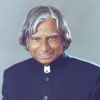Abdul Kalam

Abdul Kalam
Avul Pakir Jainulabdeen "A. P. J." Abdul Kalamwas the 11th President of India from 2002 to 2007. A career scientist turned politician, Kalam was born and raised in Rameswaram, Tamil Nadu, and studied physics and aerospace engineering. He spent the next four decades as a scientist and science administrator, mainly at the Defence Research and Development Organisationand Indian Space Research Organisationand was intimately involved in India's civilian space program and military missile development efforts. He thus came to be known...
ProfessionScientist
Date of Birth15 October 1931
CityRameswaram, India
Abdul Kalam quotes about
I have already met one million youth and when they grow up what they will say about me is most important for me.
My government is committed towards creating such an environment so that the latent potential of our people can blossom and create a new India of our dreams.
Nuclear scientists have always shown the country how nuclear technology can be used for increasing the agricultural produce, medical application and nuclear power generation.
How accurately can the law fix the crime? There has to be a mechanism for very fast action. The law is like this: catch them and punish them.
A teacher should have a creative mind.
All wars signify the failure of conflict resolution mechanisms, and they need post-war rebuilding of faith, trust and confidence.
DONT DECLARE HOLIDAY ON MY DEATH, INSTEAD WORK AN EXTRA DAY, IF U LOVE ME
We need to create brand institutions. In the fortune 500 companies, 5 Indian companies are named while 15 are from China though we have similar kind of populations.
The Earth is the most powerful and energetic planet.
Science has revealed that the human body is made up of millions and millions of atoms... For example, I am made up of 5.8x10^27 atoms.
Every nation has to follow a certain policy: Commercial, trade, various other types of policies.
When a nation is surrounded by weaponized nations, she has to equip herself.
Today, India consumes about 682 watts per capita, far lesser than developed nations. As India develops, it will definitely require a lot more energy.
Everyone's life is a page in the human history irrespective of the position he or she holds or the work he or she performs.